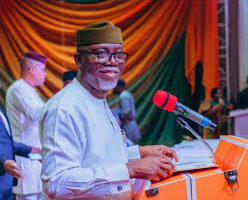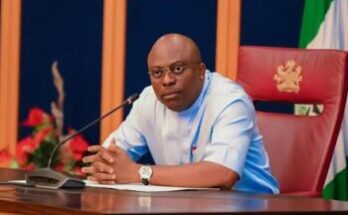The chairman Senate Committee on Judiciary, Human Rights and Legal Matters, Senator Opeyemi Bamidele (APC Ekiti Central), says the Senate will soon deliberate on its committee’s report on the court invasion by the Directorate of State Security Service (DSS). Taiye Odewale. Excerpts.
But if we begin to look at the moral of rising debt profile, shouldn’t we be concerned and sometimes wonder how we are going to pay?
This is also bringing Nigeria to a point where it is not just anybody that can just say I want to lead, but people who have the scientific understanding of what it is to be done. If you don’t, it is only a matter of a month that your weaknesses will be exposed. It is either the people wait for the next election to vote you out or, if the incompetence is so gross, they invoke the constitutional provisions to remove you from office.
I can also foresee a situation in the very near future where the international lenders will have to wipe off some loans. It is not about Nigeria alone; it is a global concern.
But can Nigeria fold its arms and let the economy go down because it does not want to be indebted? The hungry man wants to be fed, those working want to be paid. It is the headache of the government how you want to get it done. These are issues that we have to continue to comprehend along and it is within that context that we have to continue to view the rising debts profile.
The alternative to it is chaos; the government not doing anything and allowing the whole system to collapse. Of course, other world leaders will laugh at Nigeria. That is why the anti-corruption crusade must be supported to ensure that truly when these monies are coming in, they are being applied in a way that we will be able to explain to our generation what they are used for. As to the rising debt profile, the government might not have a choice than to continue to source for money to fund the budget and other economic programmes.
Nigerians are concerned that the Senate wants to sweep the report of your committee’s investigation of the DSS invasion of court under the carpet. What is really the situation?
Our intervention yielded positive results. One week after we made an intervention and addressed the issue on the floor of our parliament and at committee level, the United States Senate, through one of its committees, also addressed the issue. As a result of that, the Nigerian government saw the need to address the issue very quickly and the gentle man (Sowore) was released. But that did not stop us from carrying out the reminder of the assignment.
So, we submitted the report in June, but because of our rule that when something is meant to be reported on the floor of the parliament, you cannot discuss the report before the Senate takes a look at it. That’s why we have not said anything in that regard. I’m sure soon, after our recess, this must be one of the reports that will be considered.
What is your take on the FIRS plan to collect stamp duty on rent?
The FIRS has a mandate to generate revenue for the country within the extant law and the Act establishing the agency, and in doing that, they cannot be arbitrary. There, however, is a limit to the discretion they have. I’m convinced that the FIRS knows well enough not to do anything outside of its mandate. The Senate Committee on Finance is interfacing with the FIRS on the issue. I’m sure it will be among the issues that will be addressed.
The Senate Committee on Judiciary, Human Rights and Legal Matters you chaired seem to operate on the model of legislative activism, which is different from the previous ones. What do you have to say on that?
The times are different, and leadership is also defined by the character of whoever is on the saddle. The 9th assembly, from the very beginning, chose for itself some form of legislative agenda targeted at making it possible for Nigerians to see a radical departure from what had been the norm in this country in the area of its relationship with other arms of government.
Secondly, it is to also carry ourselves in a way that Nigerians will see some positive difference. This is not an attempt to undermine either the leadership or the membership of the previous sessions of the National Assembly, but we felt that something was going to change.
In other words, this is not the time for any undue grandstanding. This is the time for us to identify what our vision is and work in that regard. We also believe that we must be able to drive certain reforms, and we identified different sectors where we wanted to push the reform – power, electoral and judicial reform.
And this brings us to the second issue, that is, leadership being defined by whoever is on the saddle. I’m a product of the collective struggle of the Nigerian civil society. It will be very difficult for me to forget where I was coming from. I see myself as a highly privileged person, in terms of having started early enough in life. At the age of 19, I was privileged to be elected as public relations officer of the Student Union Government. I graduated, did my NYSC and went to the University of Benin again to study law. I ended up again as the president of the Student Union and later as the president of National Association of Nigerian Students.
I have been exposed early enough to leadership, challenges and responsibilities. By virtue of this responsibility, I have to go to each and every campus of universities, colleges of education and polytechnics across the country. Again, it was an opportunity to truly know Nigeria.
I came into government with a reputation and sense of communal ownership. At the commencement of this civilian rule, I was not in the country in 1999. I was one of those who fled the country. I was granted political asylum by the government of the United States.
Again, I had to go back to school to do my Masters programme. It was like starting law all over again. This was between 1995 and 1999. I was practicing law and had what was like a dream job as a young man at the Harvard Law School, where we ran a pro bono legal services funded by the Ford Foundation for the immigrant community and the less privileged who could not afford to hire private attorneys.
I was doing so passionately when Asiwaju won the election in Lagos and he insisted that I must come to serve the people of Lagos with him. I served in the cabinet of Lagos state for a total of eleven and half years both as special adviser and commissioner.
Later, I decided to go to Ekiti, my state of origin to contest election to come to the National Assembly and ended up in the House of Representatives.
The reason I went through all of these is to show that I didn’t get here just by chance. I had the privilege of being groomed at different levels. There is no way I will end up serving as chairman of the Senate Committee on Judiciary, Human Rights, and Legal Matters that it will be business as usual. It would have been a disservice to myself and the various stakeholders who, I believe, had invested their time, ideological commitment and consciousness in me.




